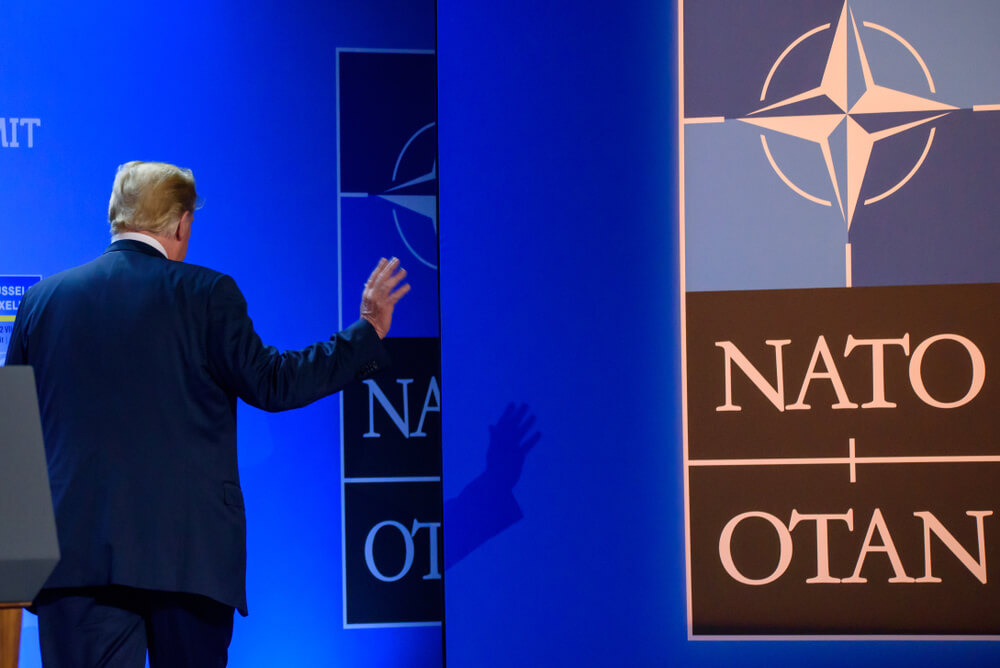The UK government’s foreign policy mantra has been that Britain will not make a choice between prioritising relations with either Europe or the United States since its national interest depends on working with both.
That doctrine is under growing strain after a traumatic week in which Donald Trump’s administration signalled a retreat from the US’s long-standing commitment to European security, Britain’s included.
Prime Minister Keir Starmer apparently still believes, however, that the UK can act as a bridge between the US and Europe as the latter confronts the consequences of Trump’s unilateral moves on Ukraine.
As he headed to Paris for this week’s emergency meeting of European leaders, Starmer wrote that Europe and the US must work closely together to achieve lasting peace in Ukraine and that the UK could play a unique role in helping that happen.
That may sound like wishful thinking after the UK was left as much out of the loop as were its European allies by Donald Trump’s decision to call Russia’s Vladimir Putin to kickstart a potential Ukraine peace deal.
Special relationship
Starmer mercifully avoided the fraying phrase ‘special relationship’ in an article published in The Telegraph. He is evidently optimistic nevertheless that he stands a better chance of bending Trump’s ear than Britain’s erstwhile partners in the EU, given the US president’s stated antagonism towards the union.
The business secretary, Jonathan Reynolds, made the point on the government’s weekend news round when he said the UK was well placed to try to keep the Western allies together. “There is definitely, from the US administration, a view towards Europe and there’s a slightly different view towards ourselves in the UK,” he told the BBC.
“I believe we in the UK can play a part, as that bridge between the US and Europe as we adjust to this new era,” he said, echoing Starmer’s view.
The trouble with the ‘bridge’ metaphor is that it suggests a conciliatory middleman role
The trouble with the ‘bridge’ metaphor is that it suggests a conciliatory middleman role, while in reality the UK is located, geographically and strategically, firmly at the European end of the figurative span.
Starmer made the point himself when he wrote that ‘we’ were facing a once-in-a-generation moment for the collective security of ‘our’ continent, adding, “This is not only a question about the future of Ukraine—it is existential for Europe as a whole.”
Avoiding the trap
If the UK indeed enjoys a more favoured status at the White House than Trump’s hated EU, then Starmer should use the advantage to speak for Europe and avoid the trap of being used primarily as Trump’s messenger to the Europeans.
Ahead of a visit to Washington, possible as early as next week, Starmer has already expressed readiness to put British troops on the ground as part of any eventual peacekeeping force in a move expected to find favour with Trump.
Although the offer is regarded as a premature move by some of his European partners, Starmer would make it subject to conditions when he discusses it with Trump, insisting that a continued US security guarantee is the only path to peace in Ukraine.
Starmer has gone along with the principle that Europe must meet US demands to spend more on its own defence
He will also press for Ukraine’s presence at any talks involving its future and continued support for its irreversible path to one day joining NATO.
Starmer has gone along with the principle that Europe must meet US demands to spend more on its own defence, something that now looks more than ever a necessity rather than a choice.
Despite the government’s ‘must do more’ rhetoric, the prime minister has yet to spell out where the UK would find the funds and how they might be spent.
Do not trust the ‘Russian bear’
The government’s strongly pro-Ukrainian stance is broadly shared across the political spectrum and among the public and is firmer than in most continental European countries.
Even the would-be Trump whisperer, Nigel Farage, has come onside, arguing for Ukraine’s eventual membership of NATO, after his more ambivalent views slowed his right-wing Reform party’s otherwise substantial rise in opinion polls.
 Despite Trump’s enthusiasm for doing deals, Starmer might play on his fear of being duped and ending up looking like a loser
Despite Trump’s enthusiasm for doing deals, Starmer might play on his fear of being duped and ending up looking like a loser
Across the board, pro-Ukraine solidarity might start to weaken as politicians and voters assess the cost. Starmer’s only available option is to argue that, in Europe’s newly evolving security reality, the UK has no choice.
Perhaps he will offer some further clues on spending to smooth his encounter at the White House.
More importantly, he can try to persuade Trump of the long-term dangers of a quick diplomatic win with Russia that could have a negative geopolitical impact further down the road. Warning its allies not to trust the ‘Russian bear’ is a well-established trope of British diplomacy that goes back centuries.
Despite Trump’s enthusiasm for doing deals, Starmer might play on his fear of being duped and ending up looking like a loser. Starmer already hinted at this potential vulnerability in his reflections before the Paris talks.
Reminding Trump of Afghanistan, where his first administration negotiated directly with the Taliban over the heads of the Afghan government, he wrote in his Telegraph article, “We cannot have another situation like Afghanistan.”
He added pointedly, “I feel sure that President Trump will want to avoid this too.”